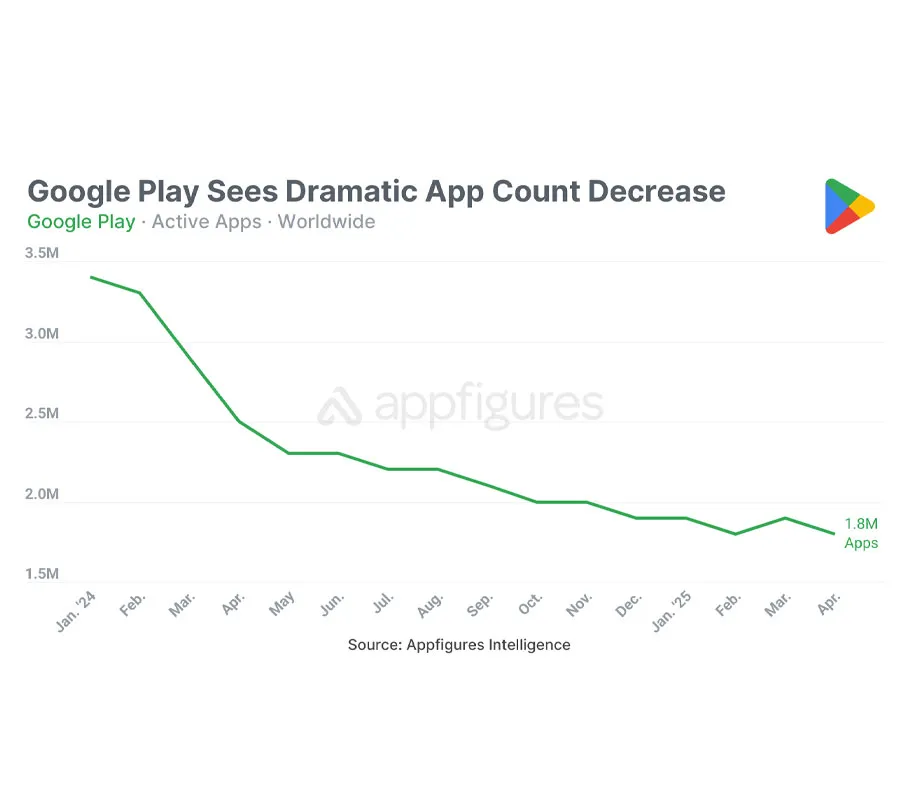Why apps are disappearing from the Google Play Store

Do you know why apps are disappearing from Google Play Store? Strict policies, outdated software rules, and rising compliance demands are clearing out millions of titles, reshaping the Android ecosystem and forcing developers to adapt or exit.
The Google Play Store, once the largest repository of mobile applications in the world, has seen a dramatic contraction in size over the past five years. According to data compiled by analytics firm Appfigures, the total number of apps available on the platform has dropped from around 2.6 million in 2018 to just 1.3 million by the end of 2024. This marks a decline of nearly 50 percent, a startling figure that reflects more than just routine app removals or developer disinterest. Instead, it signals a deeper transformation in how Android’s official app marketplace operates and how Google is redefining the expectations for participation in its ecosystem.
Why apps are disappearing from Google Play Store and what it means for the future of Android apps
A major contributor to this decline has been Google's increased enforcement of policy compliance, especially concerning app security, privacy standards, and update frequency. The company now removes apps that have not been updated within two years, a move meant to protect users from outdated and potentially vulnerable software. While this effort has undoubtedly improved the quality and safety of the remaining apps, it has also culled a vast number of older applications that may have been functional but were simply not maintained regularly. This includes utility tools, educational content, hobbyist projects, and other niche offerings that filled specific but less commercially viable needs.
Google’s decisions have not occurred in a vacuum. Regulatory pressures have intensified across the globe, pushing digital platforms to comply with stringent user data protections like Europe’s General Data Protection Regulation (GDPR) and similar frameworks in other jurisdictions. These laws demand clear consent policies, data access transparency, and the minimization of personally identifiable information collected through apps. As Google aligns its internal policies to match these global standards, many developers, particularly small teams and independent creator, are finding it difficult to keep up. The cost of compliance, both in development effort and legal oversight, has become a significant barrier to entry.
For developers still active on the Play Store, the climate has changed. To maintain visibility and relevance, apps must be regularly updated to meet the latest Android API level requirements, integrate new system permissions models, and support a growing list of accessibility and security features. The result is that only developers with the resources and infrastructure to handle continuous updates and compliance reviews are thriving. Hobbyist apps, experimental tools, and regional applications with limited reach are often left behind, unable to justify the effort it takes to meet Google’s rising bar for participation.

Google Play sees dramatic app count decrease
Despite the sharp reduction in available apps, this shift does not suggest that the Play Store is shrinking in importance or relevance. On the contrary, the platform remains the central hub for Android application distribution and retains a dominant position in the mobile software landscape. As of early 2024, Android commands nearly 70 percent of the global mobile operating system market, according to StatCounter. However, the Play Store’s narrowed catalog points to a philosophical change in how Google views the role of its marketplace, not as a free-for-all directory, but as a curated, safer, and more commercially aligned destination.
This evolution brings with it both benefits and drawbacks. On one hand, users are more likely to find apps that are well-maintained, secure, and up-to-date. The risk of downloading malware-laden or broken applications has been significantly reduced. Google has also refined its app review process and implemented better automated systems to detect problematic behavior. For the average consumer, these improvements might make the Play Store feel more polished and trustworthy. On the other hand, the sense of discovery and experimentation that once defined the Android ecosystem has diminished. The diversity of tools available, once one of Android’s greatest strengths, has suffered as fewer small developers can participate.
What’s notable is that this contraction isn’t just a passive result of neglect. Google has deliberately designed policies to reduce the number of apps that don't meet current standards. These policies include updated API level requirements, mandatory support for newer Android versions, and stricter guidelines for data usage disclosures. The company has even publicly stated its aim to remove apps that do not align with modern privacy and security practices. While this has been marketed as a user-centric decision, the collateral effect on the developer community is undeniable.
The financial implications are also worth noting. With fewer apps available, but those remaining being higher quality and often more commercially focused, revenue may become concentrated among a smaller group of top developers. Many of the most downloaded and profitable apps belong to large publishers or well-funded companies that can afford frequent updates, extensive testing, and compliance audits. This could lead to a situation where indie developers, once central to Android’s rapid app growth, are forced to turn to other platforms or abandon app development entirely.
Some developers are indeed seeking out alternatives. App stores like Amazon’s Appstore, Samsung’s Galaxy Store, and even open-source-friendly platforms like F-Droid are seeing renewed interest as developers look for less restrictive distribution options. Others are shifting toward web-based progressive web apps (PWAs), which offer many of the same functionalities as native apps without requiring Play Store approval. These trends highlight a growing desire among developers for autonomy and flexibility, traits that used to define Android itself. For startups and brands navigating this changing landscape, working with a seasoned mobile development team can make the difference between getting buried in policy rejections or launching successfully. At Moonbeam Development, we help businesses build, launch, and maintain mobile apps that are fully compliant, optimized, and ready for today’s platforms, and whatever comes next. Whether you're looking to update a legacy app or build something entirely new, we guide you through the process with the clarity and strategic thinking the current app ecosystem demands.
Google’s decisions also reflect a broader industry trend. Across digital platforms, from browser extensions to streaming libraries, the push for tighter control and higher content quality is becoming standard. Companies are reducing the scope of their catalogs to ensure better compliance, improve user experience, and reduce liability. But this comes with trade-offs in terms of creativity, experimentation, and user choice.
The Play Store’s shrinking inventory raises fundamental questions about the future of Android’s openness. For many years, one of Android’s core selling points was its embrace of a more open, developer-friendly model. That openness has always come with risks, but it also encouraged innovation and allowed global creators to bring tools to market with minimal friction. As Google asserts greater control, the line between Android and its more closed competitor ecosystems begins to blur.
This transition may be necessary as the platform matures and as global scrutiny of digital markets continues to increase. But it also represents the end of an era for Android, a move away from the wild, expansive spirit of its early years toward a more corporatized, controlled, and ultimately safer environment. Whether this trade-off is worth it will depend on the balance Google strikes between innovation and safety, freedom and regulation, inclusiveness and gatekeeping.
About the Author

CEO
Richard Harris is widely regarded as a pioneer in the software industry, with over 30 years of experience as a founder, executive leader, and technology strategist. Throughout his career, he has launched and scaled numerous ventures across mobile, SaaS, publishing, and data intelligence. Richard is the founder of App Developer Magazine, Chirp GPS, MarketByte, and several other startups—each focused on solving real-world challenges through innovative, developer-centric solutions. He has spent decades architecting scalable platforms and building infrastructure that powers digital growth—from real-time location intelligence to content syndication engines. Whether streamlining developer workflows, modernizing logistics, or enabling cross-channel marketing automation, Richard’s leadership continues to drive operational clarity and product excellence in a rapidly evolving tech landscape.





